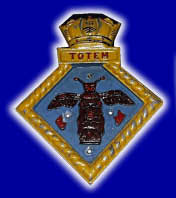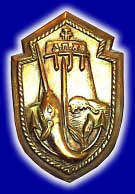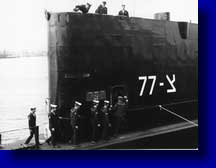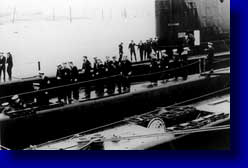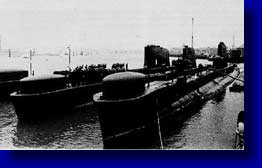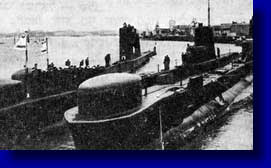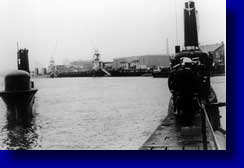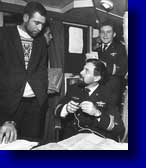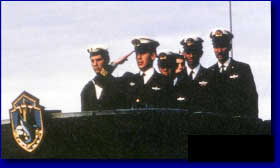|
Dakar was purchased by Israel in 1965, together with her 2 sister submarines, from the British Navy. The submarine was built by H.M. Dockyard in Davenport and was launched as H.M.S. Totem on 28th September 1943. In the mid 50's the submarine was renewed and refitted. 12 feet were added to the length of the pressure hull. The deck gun was removed, 2 more electrical motors were put in and the boat was streamlined with an enclosed new conning tower and a new bridge. |
|
Click
on small pictures to enlarge
|
|
H.M.S.
Totem during the
40's |
H.M.S.
Totem after modification of the 50's
|
|
On
November 10th 1967 she was commissioned by the Israeli Navy.
Under the command of Lieutenant Commander Ya'acov Ra'anan(Frisch) the
Israeli Navy ensign was hoisted and she was given a Hebrew name, DAKAR.
Right after the commission ceremony Dakar left for Scotland for her
sea and dive trials.
|
 |
||
|
Submarine
changes hands. Totem becomes Dakar as the British flag is taken down
the Israeli one is hoisted over the bow of the boat
|
||
|
Dakar
stayed in Scotland for 2 months and passed her sea and dive trials under
the supervision of the experts of Israeli and Royal Navy. Towards the
end of the year 1967 Dakar returned to Portsmouth and made preparations
for her voyage to Israel.
|
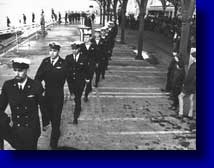 |
|
|
Right
after the commission ceremony Dakar's crew members embark their boat.
Dakar left right after the ceremony to Scotland
|
|
|
On
January 9th 1968 Dakar was ready to cast off and leave for
her long voyage to Israel. Just before her departure another ceremony
took place. A third "T" class submarine was purchased; H.M.S.
Truncheon became INS Dolphin and delivered to the Israeli Navy on the
same day. After a short ceremony, on a gray wintry snowy day, INS Dakar
left slowly the submarine pier at H.M.S. Dolphin at Portsmouth and started
her ill-fated journey.
|
|
Six
days later, on the morning of January 15th Dakar enters Gibraltar. At
midnight on the same day Dakar cast off and left Gibraltar. It was the
last time that the Dakar and her crew were seen.
|
|
Ya'acov
Ra'anan, skipper of the Dakar had received his orders from the Navy
headquarters in Haifa and Dakar should have made her way across the
Mediterranean submerged, using her snorkel. According to established
submarine procedure Dakar radioed her position to the HQ in Haifa, every
24 hours, and radioed a control telegram every 6 hours. Dakar should
have entered her home base on Friday, February 2nd. As the
Dakar was making a faster progress than expected, Ra'anan requested
permission to enter port earlier. He got an approval to enter on January
29th. Later Ra'anan requested to enter yet another day earlier,
on January 28th. This request was denied by the HQ, as the
welcoming ceremony had already been planned.
|
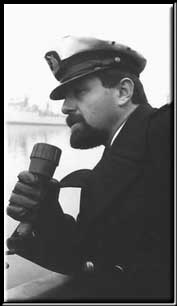 |
|---|
|
Mizrachi,
Ra'anan, Har-Even
|
Over
the bridge of the Dakar
|
|
At
0610 hours, on the 24th of January 1968, Dakar just passed
Crete and transmitted her last known position, 34.16N 26.26E. In the
next 18 hours Dakar radioed 3 more times. All of them were control
transmissions, which did not include her position. Two minutes after
midnight on the 25th of January 1968, Navy HQ received the
last coded telegram from the Dakar. The next radio message should have
been received at 0600 hours, on the next morning, Israeli time. Nothing
was received from the Dakar at that time. Listening for the Dakar was
intensified and radio messages were sent to her. It was assumed
that she was experiencing communications difficulties. During that day,
Dakar was repeatedly called using her international call sign, 4XP-Z.
No further signals came from Dakar.
|
|
Click
on PLAY in order to view Dakar's route
(9th January - 25th January 1968)
|
|
On
the morning of the 26th of January an international Search
And Rescue operation was launched. All available Israeli ships and airplanes
joined the SAR efforts. Navy and air units
from Great Britain, the USA, Greece, Turkey and even Lebanon took part
in the SAR efforts. On the 27th of January, a radio station
in Nicosia, Cyprus, received a SOS call on the frequency of Dakar’s
emergency buoy . It was assumed that the transmission was sent somewhere
from south east to Cyprus. This area was searched without any results.
On January 30th, the search and rescue operation HQ in Cyprus
determined that chances for the submarine still to survive were close
to nil. It was decided to stop all search efforts 24 hours later. All
foreign forces ceased the search at the sunset of the 31st. Israeli
forces continued the search for another four days. As the sun went down
on the day of February 4th, 1968 all ships and planes returned
to their home bases. The search for the INS Dakar was called off.
|
Farewell Shipmates
|
On
March 6th, Israel's defense minister, Moshe Dayan gave an
official statement at the Kneset (Israeli Parliament) about the loss
of INS Dakar and her crew. A day of national mourning was proclaimed.
The Israel Defense Forces Chief Rabbi declared that all of the sixty-nine
missing sailors would be considered dead according to the Halacha
(Jewish law). |
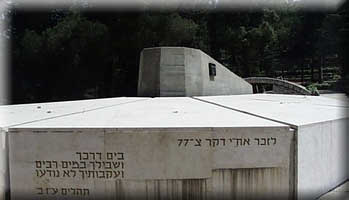
|
On
Mount Herzel in Jerusalem within Israel's national and military cemetery
there is a monument to the Dakar and her crew. Sixty-nine names are
engraved on a submarine-like tomb. Every year, on the Hebrew date, 7th
of Adar, the day of the death of the prophet Moses whose grave is known
only to God, Israel mourns and remembers her missing soldiers, airmen
and sailors. Among those who will always be remembered are Dakar's sixty-nine
men.
|
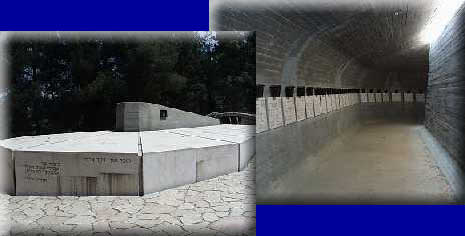
An Indian Legend
|
The Royal Navy submarine museum is located in
Gosport, not far from the submarine pier that Dakar cast off on 9th
of January 1968. The museum dedicates a
corner to
Dakar and her crew:
|
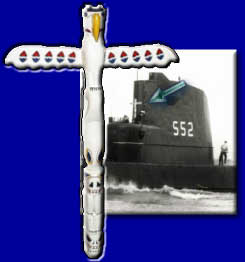 |
Before
transfered to the Israeli Navy the Dakar was a British submarine named
Totem. In 1945 HMS Totem is in her first commission and she is presented
with a totem pole by the Cowichan Tribe in Canada. The legened attached
is that as long as the totem pole sails with HMS Totem, she will come
to no harm. Over twenty years the pole with its figures representing
the Thunderbird, the Grisly Bear, the Killer Whale and the Fire God
is fitted to the front of the bridge when entering and leaving harbour.
After refit in 1967, HMS Totem is trasfered to the Israeli Navy and
renamed Dakar. She is lost with all hands in the Mediterranean whilst
enroute from Portsmouth to Haifa.
|
For more information please visit the following pages:
 |
 |
 |
 |
 |
 |
Sponsored
by :
Zahal, IDF, Israel military store

